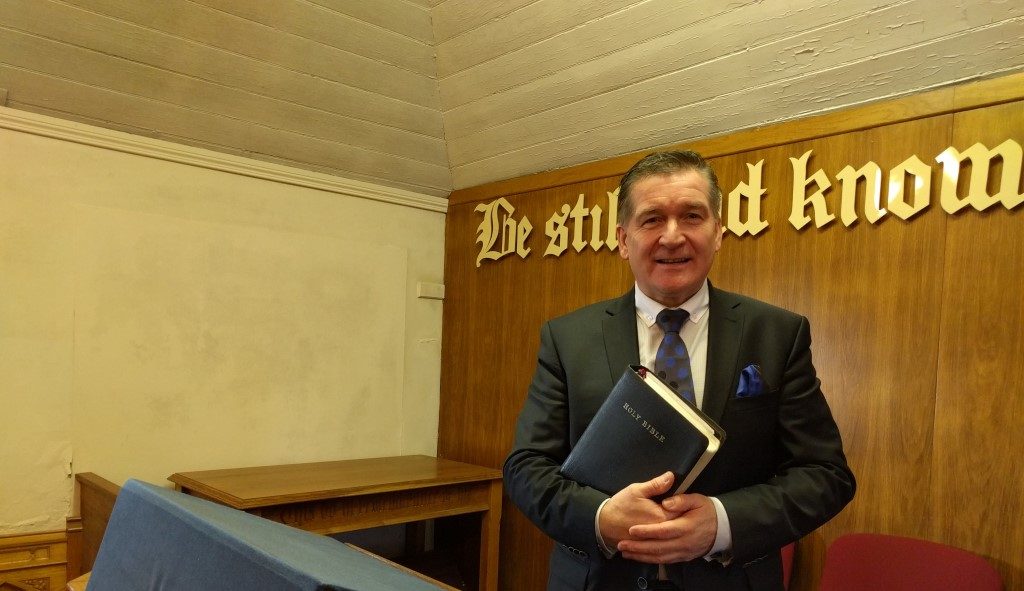Date: THU 8:00 PM 5th June 2025
Singer: Helen Magill
Preacher: Mr. Noel Shields
Bible Reference: Romans 6:23
For the wages of sin is death; but the gift of God is eternal life through Jesus Christ our Lord.
Sermon Summary: Romans 6:23 – “Death or Life”
Scripture Focus: Romans 6:23 – “For the wages of sin is death, but the gift of God is eternal life through Jesus Christ our Lord.”
Title: Death or Life
Overview: The sermon, delivered with urgency and conviction, centers on the stark contrast between the consequences of sin and the hope offered through salvation in Jesus Christ, as presented in Romans 6:23. The preacher emphasizes two key realities—death as the inevitable result of sin and eternal life as God’s gracious gift through Christ. The message is directed to both the saved and the unconverted, underscoring the universal relevance of the text and urging listeners to choose life by turning to Christ.
Key Points and Themes
- The Universal Sentence of Death:
- The Wages of Sin: The preacher begins by highlighting that sin carries a divine and deserved penalty: death. This sentence is universal, affecting every person without exception, as Romans 5:12 states, “Wherefore, as by one man sin entered into the world, and death by sin; and so death passed upon all men, for that all have sinned.”
- Types of Death:
- Spiritual Death: Illustrated through Adam’s fall in Genesis, the preacher explains that sin separates humanity from God, leaving individuals spiritually dead, as seen in Adam hiding from God (Genesis 3) and described in Ephesians 2:1 (“dead in trespasses and sins”). Unconverted individuals are depicted as spiritually unresponsive, indifferent to God’s love and salvation.
- Physical Death: Sin introduced physical death, as evidenced by Adam’s eventual death (Genesis 5:5). The preacher notes God’s mercy in delaying immediate death but stresses its inevitability unless Christ returns first.
- Eternal Death: The sermon warns of the “second death” (Revelation 20:14), an eternal separation from God in hell for those who remain in sin. Jesus’ words in Matthew 10:28 emphasize the gravity of this eternal consequence, urging listeners to fear God, who can destroy both body and soul in hell.
- Deserved Wages: The term “wages” implies that death is earned through sin, with greater sin leading to greater punishment (Romans 2:5). The preacher cites commentators like Matthew Henry, who described sinners as “dead men” walking under God’s judgment, and others who note that sinners “work hard” to earn their punishment by persistently rejecting God.
- The Gift of Eternal Life:
- A Divine Contrast: The sermon pivots on the word “but” in Romans 6:23, introducing the hope of salvation. While sin earns death, God offers eternal life as a free gift through Jesus Christ.
- Characteristics of the Gift:
- Free: Salvation cannot be earned through works, as Ephesians 2:8-9 clarifies (“For by grace are ye saved through faith; and that not of yourselves: it is the gift of God: Not of works, lest any man should boast”). Unlike religions based on merit, Christianity offers grace freely.
- Personal: The gift is from God Himself, given directly to sinners (John 17:2). The preacher emphasizes that God, whom humanity has sinned against, graciously provides this gift.
- Passionate: The gift reflects God’s love, demonstrated through Christ’s sacrificial death (John 3:16; 1 John 4:9). Christ’s blood, described as priceless, was shed to purchase salvation (Acts 20:28), washing away the “crimson stain” of sin.
- Permanent: Unlike worldly gifts that can be lost or stolen, eternal life is secure. Jesus’ promise in John 10:28-29 assures that no one can pluck believers from His or the Father’s hand, guaranteeing eternal security.
- Pleasant: Salvation brings forgiveness, peace with God, and the hope of heaven (John 14:2). The preacher counters the notion that Christianity is a “boring” life, asserting that the happiest people are those saved by Christ, as illustrated by Habakkuk 3:18’s joy in salvation.
- A Call to Choose Life:
- The sermon repeatedly frames the choice as binary: death or life, eternal punishment or eternal life. The preacher urges the unconverted to recognize their state under the death sentence and to repent and trust in Christ to receive the gift of eternal life.
- The message is evangelistic, appealing to listeners to turn from sin, trust Christ, and experience the transformative power of salvation. The preacher offers assistance to those seeking to respond, emphasizing that salvation is a personal transaction between the individual and God.
Key Illustrations and Applications
- Courtroom Imagery: The preacher likens God’s judgment to a courtroom where the verdict for sin is death, contrasting it with the higher authority of God’s court over human institutions like the UK Supreme Court.
- Adam’s Fall: The story of Adam and Eve illustrates the immediate spiritual death and eventual physical death resulting from sin, serving as a warning of sin’s seriousness.
- Contemporary Examples: The sermon references real-world scenarios, such as a stolen £185,000 watch and a lost necklace, to contrast the temporary nature of worldly possessions with the permanence of God’s gift.
- Personal Testimonies: The preacher mentions conversations with others about the spiritual deadness of those who repeatedly reject the gospel, reinforcing the urgency of responding to Christ.
Tone and Delivery
- The sermon is delivered with earnestness and passion, reflecting the gravity of the subject matter. The preacher uses repetition (“death or life”) to drive home the binary choice and employs direct, confrontational language to challenge the unconverted to consider their spiritual state.
- The tone shifts from solemn warnings about sin’s consequences to hopeful encouragement when discussing God’s gift, balancing fear of judgment with the joy of salvation.
- The preacher incorporates hymns (e.g., “Amazing Grace” and “Jesus Paid It All”) and personal anecdotes to connect with the audience emotionally and reinforce the message.
Conclusion
The sermon concludes with a final appeal to choose life over death by trusting in Jesus Christ. The preacher reminds listeners that Christ bore God’s wrath on the cross, offering salvation to all who repent and believe. As they leave the meeting, they are encouraged to reflect on Romans 6:23 displayed at the exit and to make a decision for Christ, with the assurance that the church is available to help.
Core Message: Sin earns death—spiritual, physical, and eternal—but God offers the free, personal, passionate, permanent, and pleasant gift of eternal life through Jesus Christ. The choice is clear: death or life.
Subscribe to the podcast here:
Spotify Podcasts | Apple Podcasts | Pocket Casts
Email | RSS | more information here







